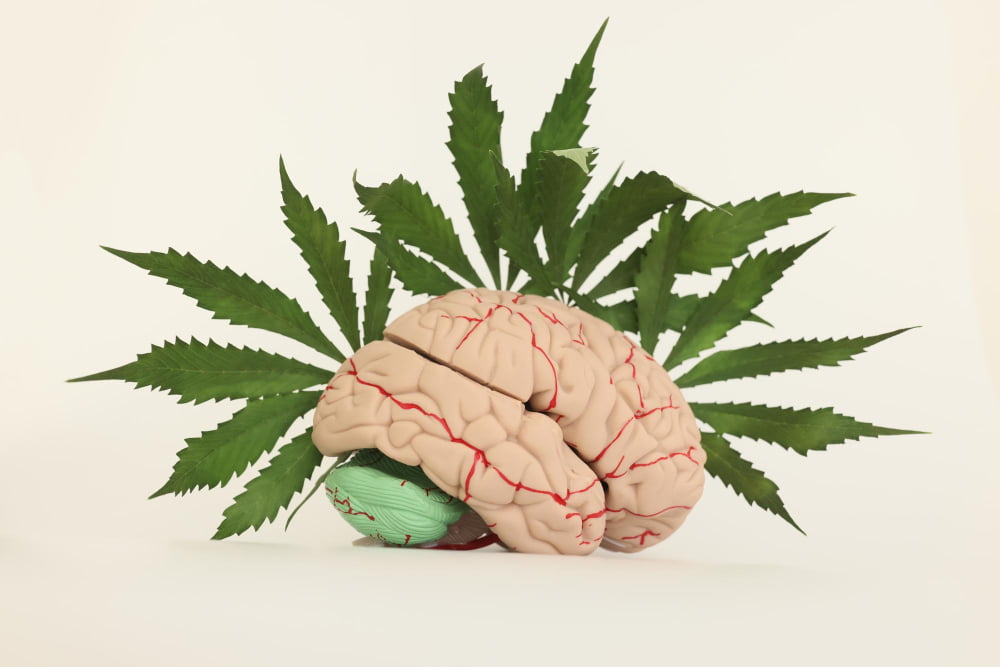Explore how cannabis can potentially enhance your meditation experience because of its profound psychoactive effects, creating a unique intersection of mindfulness and modern science.
Meditating while high is a topic of interest for many, often sparking curiosity about the potential enhancement of the meditative experience. Yes, it is possible to meditate while under the influence of cannabis. However, it’s essential to understand the intricacies involved, as the effects can vary greatly depending on the individual, the strain of cannabis used, and the person’s level of experience with both meditation and cannabis.
This article delves into the details, offering insights into how cannabis can influence your meditation practice, potential benefits and drawbacks, and tips for those who wish to explore this path. It’s a comprehensive guide that aims to answer all your questions about meditating while high.
Key takeaways:
- Cannabis can enhance sensory perception during meditation
- Reduces anxiety and promotes relaxation
- Heightens self-awareness and alters time perception
- THC and CBD interact with the brain’s reward system and reduce anxiety
- Finding the right strain and balancing THC levels is important
Effects of Cannabis On Meditation

Cannabis is known to enhance sensory perception, making users more aware of their surroundings, and this can greatly influence meditation. This heightened sense of being can, in turn, deepen focus and enhance the state of mindfulness.
1. Reduces Anxiety: The soothing effect of cannabis can help clear the mind, making it easier to concentrate. This is particularly useful in warding off feelings of anxiety that can hinder meditation.
2. Heightens Sensory Perception: By promoting senses like hearing and feeling, cannabis may inspire deeper introspection during meditation practice.
3. Promotes Relaxation: It’s often used as a tool for relaxation, which is a fundamental aspect of meditation.
4. Enhances Self-awareness: Consumption of cannabis boosts self-reflection and introspection, two factors central to successful meditation.
5. Alters Time Perception: Many users claim that cannabis use creates a distortion in their perception of time, which can lead to longer, more focused meditation sessions.
Remember, the impact of cannabis on meditation can vary widely between individuals, due to factors like tolerance, strain, and method of consumption among others. It’s crucial to understand these factors and how they might influence your meditation experiences.
Understanding the Interaction Between Cannabis and Mindfulness

The bond between cannabis and mindfulness isn’t as abstract as it may seem at the outset. Mindfulness and meditation are about achieving a state of awareness and acknowledging thoughts and sensations without immediate judgment, while cannabis is known to heighten sensory perception and uplift mood, which can deepen mindfulness if used appropriately.
Several factors contribute to this interaction. Cannabis is known to encourage a slower pace of thoughts and actions. This can provide an increased opportunity to focus inward and explore one’s consciousness enabling a deeper meditation.
However, achieving this requires an understanding of dosage. An excessive amount can lead to unease, which contradicts the essence of mindfulness, underscoring the importance of a regulated usage. Furthermore, individual experiences can differ greatly based on personal tolerance and the strains used, making personalization key in harnessing the potential benefits of this combination.
The Science Behind Meditating While High

Scientifically, meditation while elevated from cannabis use leverages the unique neuronal activation patterns that both activities stimulate. The primary cannabinoid compounds, THC and CBD, are known for their psychoactive and calming effects, respectively. When combined with mindfulness exercises, it may heighten one’s perception of relaxation and peace.
Some key points to bear in mind for clarity are:
- 1. THC, or Tetrahydrocannabinol, activates the brain’s reward system, inducing feelings of euphoria. These effects could potentially enhance the sense of wellbeing obtained from meditative practices.
- 2. CBD, or Cannabidiol, intrinsically has anxiety-reducing properties which might promote a calmer, more focused meditation session.
- 3. The endocannabinoid system, key in regulating the body’s stress response, could directly be influenced by cannabis use, making individuals more receptive to mindfulness-based stress reduction techniques.
- 4. Research indicates a parallelism between the neural effects of meditation and the use of cannabis – both result in heightened activity in the frontal lobe region associated with attention, awareness, decision making, and consciousness.
Practical Tips for Meditating When High

To enhance your meditation experience while high, gently accept the altered state, instead of resisting it. Allow yourself to flow with the different sensations marijuana can induce and use your awareness to reign over them.
Maintaining a consistent practice can make it easier to navigate the heightened senses that marijuana produces. A daily meditation schedule can help hone your concentration and keep you grounded while high.
Select a peaceful and comfortable setting. A familiar and comforting environment can greatly assist in maintaining focus during your meditation session, reducing the likelihood of becoming overwhelmed by the enhanced senses.
Find a meditation technique that fits when you’re high. Whether it’s focusing on your breath, body scanning, or practicing loving-kindness meditation, find what best resonates with you. Remember, every individual’s response to marijuana is unique.
Lastly, approach the session with an open mind. If the experience doesn’t meet your expectations, remain patient and continue with your practice. Over time, you’ll discover what works best for your unique needs.
Choosing Suitable Cannabis Strains for Meditation

Sativa strains, known for their uplifting and energizing effects, can heighten mindfulness meditation, invigorate the senses, and deepen the connection with one’s thoughts. They can promote a sense of well-being that sets the stage for a focused meditation session. Examples include Green Crack and Jack Herer.
On the other hand, Indica strains are known for inducing relaxation and helping to combat anxiety. They allow for a calmer meditation session, which can be beneficial for people who struggle with turning off their mind or with winding down at the end of the day. Strains like Northern Lights and Granddaddy Purple are suitable choices.
Hybrid strains balance the effects of both Sativa and Indica. Depending on the dominant strain, they can either stimulate or relax the user, or offer a mix of both. They allow for a flexible and balanced meditative experience. Examples to consider would be Blue Dream and Pineapple Express.
CBD-rich strains can be optimal for those seeking the benefits of cannabis without the heightened psychoactive experience. Known for their soothing properties, these strains can help minimize distractions by easing physical discomforts. Strains such as Harlequin or ACDC are known for their higher CBD ratio.
Bear in mind, reaction to different strains can be individual, so it’s recommended to start small, observe how each strain influences your meditative practice, and gradually adjust according to personal preferences.
Balancing THC Levels for Optimal Meditation

Achieving optimal meditation involves balancing your THC intake. THC, or Tetrahydrocannabinol, is the primary psychoactive component in cannabis. A higher concentration can induce a state of relaxation and mental tranquility, beneficial for meditation. However, it could potentially tilt the balance and lead to issues like paranoia or anxiety, which are counterproductive for meditation.
When engaging in meditation, you might want to:
- Start with low THC strains: They can provide a gentle soothing effect without overwhelming your senses, an introduction to the benefits of cannabis-enhanced meditation.
- Gradually increase dosage if needed: If you identify as an experienced consumer and are accustomed to high-THC strains, a gradual raise in dosage might positively impact your meditation experience.
- Consider CBD-to-THC ratio: High CBD strains can counteract the anxiety-inducing effect of THC, thereby ensuring a smoother meditation process.
- Listen to your body: Understanding and responding to your body’s reactions is vital. Everyone reacts differently to cannabis, hence what works for others might not necessarily work for you.
- Avoid excessive intake: As the adage goes, “Too much of anything is bad.” Excessive THC might lead to an overly intense experience that could distract from the focus and tranquility meditation seeks to engender.
- Consult a healthcare advisor: If you’re unsure about THC levels and the strain to start with, seeking advice from a health professional can guide you towards a safe cannabis mediation journey.
Exploring Challenges and Cautions of Meditating While High

While the combined experience of cannabis and meditation can lead to increased mindfulness and relaxation, there may be instances where the path becomes fogged with obstacles. A significant concern is the influence of THC, a psychoactive component in cannabis, leading to increased heart rates and feelings of anxiety or paranoia. Cannabis can enhance experiences, but in this case, the heightened senses might make meditation uncomfortable for some individuals.
Moreover, potential short-term memory impairment can hinder the cultivation of sustained attention during meditation, an essential part of the practice. Also, frequent use of cannabis might lead to dependency over time, making it challenging for one to meditate without its influence, thereby defeating the self-sufficient nature of mindfulness.
Dealing with these challenges requires caution; individuals should consider these factors and openly discuss them with health professionals before deciding to meditate under cannabis’s influence. Experimenting with lower THC strains and integrating routine days of meditation without cannabis can also create a balance allowing for a more harmonious incorporation of both practices.
FAQ
Can you meditate on edibles?
Yes, you can meditate on edibles, and it can potentially promote relaxation, but it’s crucial to pace yourself and start slowly.
When should you not meditate?
You should not meditate when you are in a distressed, depressed or anxious state.
What are the signs of deep meditation?
Signs of deep meditation include losing track of time, breathing slowly, reduced self-awareness, relaxed body, and partial memory of the meditation session.
Does meditation exhaust you?
No, meditation does not exhaust you; feeling tired initially is a common experience that indicates the body’s need for rest and release of accumulated fatigue.
How does marijuana influence the quality of meditation?
Marijuana can alter perception and cognitive function, potentially aiding in relaxation and focus during meditation but also possibly leading to dependency and an inability to meditate without it.
Can specific strains of cannabis enhance meditation practices?
Yes, certain cannabis strains, particularly those high in CBD and low in THC, can potentially enhance meditation practices by promoting relaxation and focus.
Is there a recommended dosage of THC for optimal meditation?
Currently, there is no scientifically established recommended dosage of THC for optimal meditation.